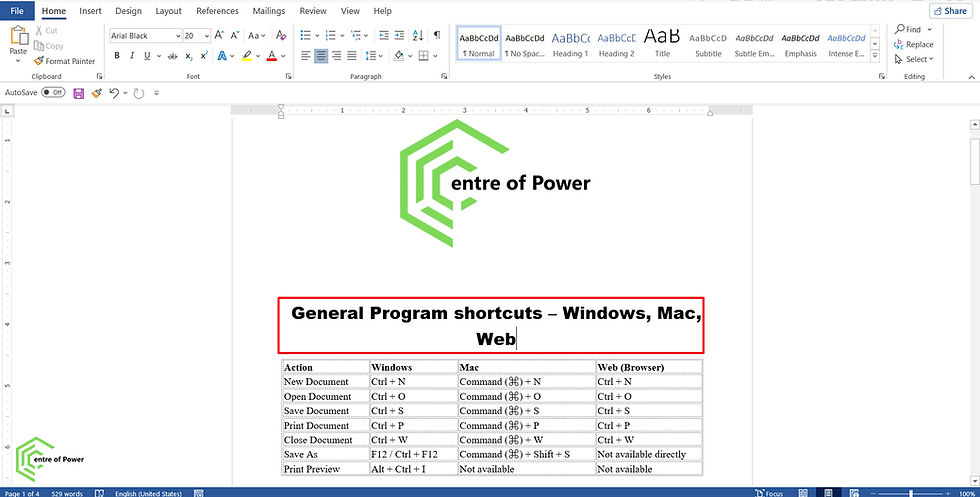MS Word: Text Formatting shortcuts – Windows, Mac, Web
- Fakhriddinbek

- Aug 27, 2025
- 4 min read
Updated: Aug 30, 2025
Creating professional, polished documents doesn’t have to be time-consuming. With the right text formatting shortcuts, you can transform plain text into visually appealing content in seconds. Whether you're working on a resume, report, or blog post, mastering these shortcuts will help you format faster and smarter.
In this guide, we’ll explore the most essential text formatting shortcuts in Microsoft Word, compare them across Windows, Mac, and Web, and show you how to use them effectively in real-world scenarios.

Why MS Word: Text Formatting shortcuts – Windows, Mac, Web Matters?
Text formatting is more than just aesthetics. It helps:
Improve readability
Highlight key points
Create structure and hierarchy
Make your documents look professional
Using shortcuts to format text means you can focus on your message—not on clicking through menus.
Microsoft Word Text Formatting Shortcuts: Platform Comparison
Here’s a detailed table showing how to format text using MS Word: Text Formatting shortcuts – Windows, Mac, Web:
Formatting Action | Windows | Mac | Web (Browser) |
Bold | Ctrl + B | Command (⌘) + B | Ctrl + B |
Italic | Ctrl + I | Command (⌘) + I | Ctrl + I |
Underline | Ctrl + U | Command (⌘) + U | Ctrl + U |
Strikethrough | Ctrl + D → Alt + K | Command (⌘) + Shift + X | Not available directly |
Superscript | Ctrl + Shift + + | Command (⌘) + Shift + + | Ctrl + Shift + + |
Subscript | Ctrl + = | Command (⌘) + = | Ctrl + = |
Increase Font Size | Ctrl + Shift + > | Command (⌘) + Shift + > | Ctrl + Shift + > |
Decrease Font Size | Ctrl + Shift + < | Command (⌘) + Shift + < | Ctrl + Shift + < |
Clear Formatting | Ctrl + Spacebar | Command (⌘) + Spacebar | Ctrl + Spacebar |
Tip: Some shortcuts may require enabling specific keyboard settings or using the formatting dialog box.
How to Use Formatting Shortcuts Effectively
Here’s a simple workflow:
Write your content first – Don’t worry about formatting.
Use shortcuts to highlight key points – Bold headings, italicize terms, underline important dates.
Adjust font size – Make titles stand out.
Clear formatting when needed – Reset styles with one shortcut.
This method keeps your writing focused and your formatting consistent.
Platform-Specific Tips
Windows Users
Windows users have access to advanced formatting via the Font dialog box (Ctrl + D), where you can apply strikethrough, small caps, and more. Combine this with:
Ctrl + Shift + >/< for quick font size changes
Ctrl + Spacebar to reset formatting
Mac Users
Mac shortcuts are intuitive and consistent across apps. Use:
Command + Shift + X for strikethrough
Command + = for subscript
Command + Shift + + for superscript
Web Users
While the web version of Word is more limited, it still supports core formatting shortcuts. For advanced formatting, use the toolbar or right-click menu.
Common Mistakes to Avoid
Over-formatting: Too much bold or underline can clutter your document.
Inconsistent styles: Use shortcuts to maintain uniform formatting.
Not clearing formatting: Residual styles from copy-pasting can be removed with Ctrl + Spacebar.
Bonus: How to Learn Formatting Shortcuts Faster
Practice on real documents: Apply shortcuts while editing.
Create a cheat sheet: Print or save a list of your most-used shortcuts.
Use keyboard overlays: Visual reminders can help.
Teach others: Sharing knowledge reinforces your own.
Real-World Use Cases
Business Reports
Use bold for section titles, italic for references, and underline for deadlines. Format quickly during meetings or while reviewing drafts.
Academic Papers
Apply subscript and superscript for chemical formulas or mathematical expressions. Use strikethrough to show edits during peer reviews.
Creative Writing
Highlight character names or plot points with formatting. Use clear formatting to reset styles when switching genres or tone.
FAQs About Text Formatting Shortcuts
Q: Can I customize formatting shortcuts in Word?
Yes, go to File > Options > Customize Ribbon > Keyboard Shortcuts.
Q: Why doesn’t strikethrough work with a shortcut on the web?
Some advanced formatting features are limited in the web version. Use the toolbar instead.
Q: What’s the fastest way to reset formatting?
Use Ctrl + Spacebar (Windows/Web) or Command + Spacebar (Mac).
Productivity Gains from Formatting Shortcuts
Let’s say formatting a document manually takes 10 minutes. With shortcuts, you can do it in 3. If you format 5 documents a week, that’s 35 minutes saved weekly, or 30+ hours a year!
That’s nearly a full workday reclaimed—just by using formatting shortcuts.
Ready to Format Like a Pro?
If this guide helped you, there’s more waiting for you at this website. We’re here to help you master office programs and unlock your full potential.
Subscribe to our newsletter for weekly tips and tutorials
Bookmark this page for quick reference
Share this article with your team or classmates
Explore our productivity hub for more guides like this



Comments